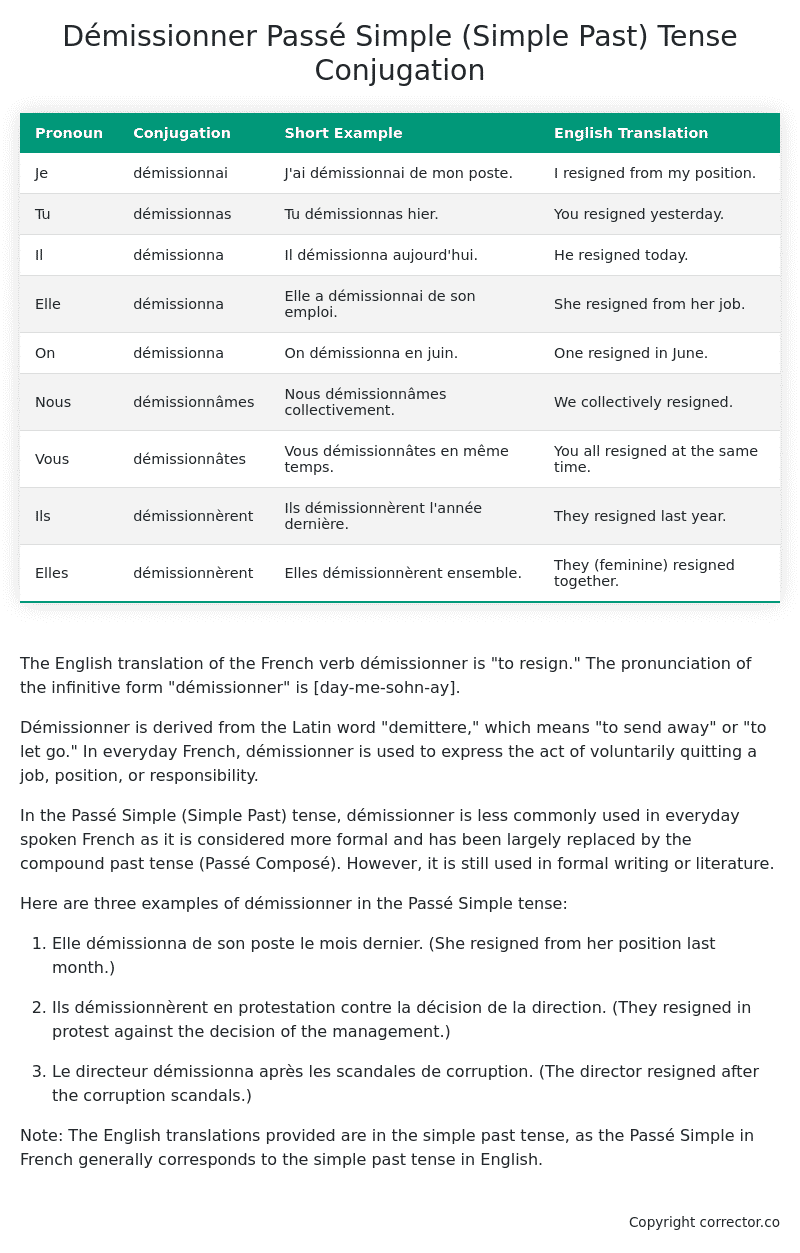Passé Simple (Simple Past) Tense Conjugation of the French Verb démissionner
Introduction to the verb démissionner
The English translation of the French verb démissionner is “to resign.” The pronunciation of the infinitive form “démissionner” is [day-me-sohn-ay].
Démissionner is derived from the Latin word “demittere,” which means “to send away” or “to let go.” In everyday French, démissionner is used to express the act of voluntarily quitting a job, position, or responsibility.
In the Passé Simple (Simple Past) tense, démissionner is less commonly used in everyday spoken French as it is considered more formal and has been largely replaced by the compound past tense (Passé Composé). However, it is still used in formal writing or literature.
Here are three examples of démissionner in the Passé Simple tense:
-
Elle démissionna de son poste le mois dernier.
(She resigned from her position last month.) -
Ils démissionnèrent en protestation contre la décision de la direction.
(They resigned in protest against the decision of the management.) -
Le directeur démissionna après les scandales de corruption.
(The director resigned after the corruption scandals.)
Note: The English translations provided are in the simple past tense, as the Passé Simple in French generally corresponds to the simple past tense in English.
Table of the Passé Simple (Simple Past) Tense Conjugation of démissionner
| Pronoun | Conjugation | Short Example | English Translation |
|---|---|---|---|
| Je | démissionnai | J’ai démissionnai de mon poste. | I resigned from my position. |
| Tu | démissionnas | Tu démissionnas hier. | You resigned yesterday. |
| Il | démissionna | Il démissionna aujourd’hui. | He resigned today. |
| Elle | démissionna | Elle a démissionnai de son emploi. | She resigned from her job. |
| On | démissionna | On démissionna en juin. | One resigned in June. |
| Nous | démissionnâmes | Nous démissionnâmes collectivement. | We collectively resigned. |
| Vous | démissionnâtes | Vous démissionnâtes en même temps. | You all resigned at the same time. |
| Ils | démissionnèrent | Ils démissionnèrent l’année dernière. | They resigned last year. |
| Elles | démissionnèrent | Elles démissionnèrent ensemble. | They (feminine) resigned together. |
Other Conjugations for Démissionner.
Le Present (Present Tense) Conjugation of the French Verb démissionner
Imparfait (Imperfect) Tense Conjugation of the French Verb démissionner
Passé Simple (Simple Past) Tense Conjugation of the French Verb démissionner (You’re reading it right now!)
Passé Composé (Present Perfect) Tense Conjugation of the French Verb démissionner
Futur Simple (Simple Future) Tense Conjugation of the French Verb démissionner
Futur Proche (Near Future) Tense Conjugation of the French Verb démissionner
Plus-que-parfait (Pluperfect) Tense Conjugation of the French Verb démissionner
Passé Antérieur (Past Anterior) Tense Conjugation of the French Verb démissionner
Futur Antérieur (Future Anterior) Tense Conjugation of the French Verb démissionner
Subjonctif Présent (Subjunctive Present) Tense Conjugation of the French Verb démissionner
Subjonctif Passé (Subjunctive Past) Tense Conjugation of the French Verb démissionner
Subjonctif Imparfait (Subjunctive Imperfect) Tense Conjugation of the French Verb démissionner
Conditionnel Présent (Conditional Present) Tense Conjugation of the French Verb démissionner
Conditionnel Passé (Conditional Past) Tense Conjugation of the French Verb démissionner
Conditionnel Passé II (Conditional Past II) Tense Conjugation of the French Verb démissionner
L’impératif Présent (Imperative Present) Tense Conjugation of the French Verb démissionner
L’impératif Passé (Imperative Past) Tense Conjugation of the French Verb démissionner
L’infinitif Présent (Infinitive Present) Tense Conjugation of the French Verb démissionner
L’infinitif Passé (Infinitive Past) Tense Conjugation of the French Verb démissionner
Le Participe Présent (Present Participle) Tense Conjugation of the French Verb démissionner
Le Participe Passé (Past Participle) Tense Conjugation of the French Verb démissionner
Struggling with French verbs or the language in general? Why not use our free French Grammar Checker – no registration required!
Get a FREE Download Study Sheet of this Conjugation 🔥
Simply right click the image below, click “save image” and get your free reference for the démissionner Passé Simple tense conjugation!

Démissionner – About the French Passé Simple (Simple Past) Tense
Formation
Usage
Narration
Historical Context
Interactions with other tenses
Passé Composé
Imparfait
Conditional and Subjunctive
Summary
I hope you enjoyed this article on the verb démissionner. Still in a learning mood? Check out another TOTALLY random French verb conjugation!


